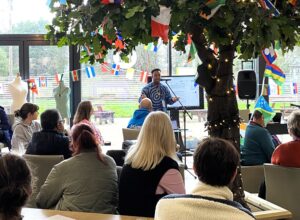Plans announced for world-leading planetarium in Wales

Plans to develop one of the world’s biggest planetariums in Wales are receiving support from pioneers including The Eden Project’s Sir Tim Smith and will transform the site of the iconic former Tower Colliery in the South Wales Valleys.
With the site no longer in use since official closure in 2008, Planetariwm Wales will be a catalytic driver for future investment, creating employment opportunities and economic regeneration in the immediate areas and wider city region.
Planetariwm Wales will kickstart economic regeneration and investment in the area through three main strands, including a Planetariwm Theatre, an Experiential Discovery Centre and an Education and Research Centre. These different zones reflect the project’s ambition to grow into a world-class centre that supports the advancement in STEM across Wales, while creating 54 jobs in the process.
Using state-of-the-art technology and the latest high-resolution imagery, the planetarium looks to not only create educating and stimulating experiences for visitors, but also act as a leading-edge facility for research and development in digital visualisation
Allan Trow, Manager of Dark Sky Wales, the mobile educational company which takes space and planet study to schools across Wales and is delivering the project, said:
This is going to be a world-leading development. Unlike other planetariums in the UK, Planetariwm Wales will seat up to 350 people and be amongst the largest planetariums in the world.
Its distinctive size and use of futuristic technology will give visitors a unique opportunity, where they can drift off into space and fully immerse themselves into space.
It’s a multi-functional experience that will stimulate, educate and entertain all generations and support the local communities and areas in the long-run.
With a diameter of 26m and a capacity of up to 350 people, it will be one of the largest planetariums in the world. Its size will attract people throughout the UK and the world, for both educational and recreational activities.
Inspired by the success of the Eden Project in Cornwall and the benefits it brought to the local area, developers of Planetariwm Wales are confident that similar success can be recreated for South Wales.
Sir Tim Smit, Vice Chair of the Eden Project, said: “Whatever is spent on Planetariwm Wales must be analysed, not in terms of what is the return of people coming to it? It is also, what is it doing to lift the pull of low expectation and creating new economic thinking and social thinking within probably thirty miles of it? Now you will find that that will be a very significant figure.
“It just takes the one statement of faith in a place for other little statements to start and a culture to develop, and then before you know it, people are coming to learn, and an education infrastructure starts to develop. And then, the people making the t-shirts, the postcards, the books, the lectures, the digital presence, the global advertising, come to Wales. Now you suddenly start to say, ‘wow’, that was a complete bargain.”
Serving as a landmark for South East Wales, the aim is to lay the first bricks for the planetarium within three years.
For more information about the Planetariwm Wales developments, visit: https://planetarium.wales/




